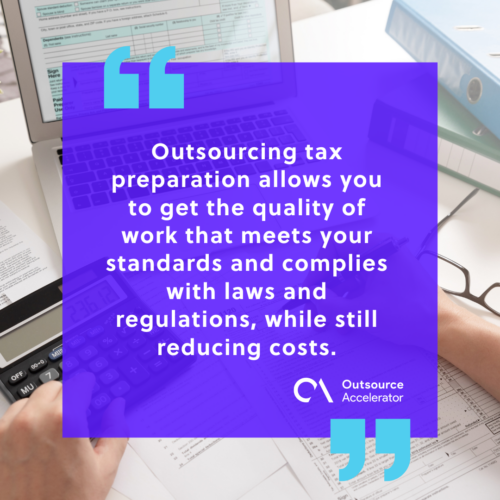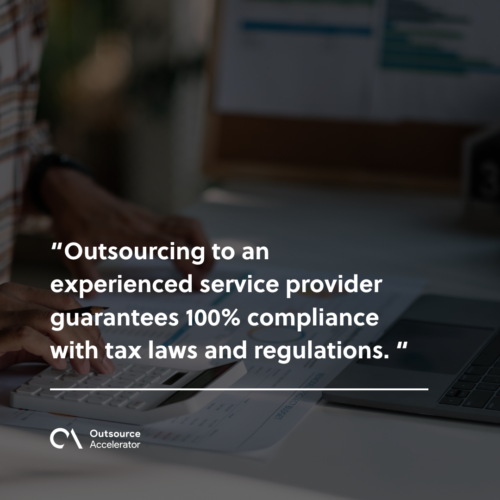Why should you outsource tax preparation?

This article is a submission by D&V Philippines. D&V Philippines has years of experience in the accounting and finance industry. This third-party services company can generate the financial reports you need to make real-time financial decisions.
Tax preparation is an important but time-consuming endeavor. Tax preparation makes sure you comply with local tax laws and regulations, get ready for audits, and maximize possible deductions.
Many companies are outsourcing tax preparation because of its cost-effectiveness.
This approach affords organizations the following advantages:
- Better utilization of their employees’ skills
- Improved processes
- Reduced need to hire
- Adopting accounting technology
- Consolidated operations
This article will examine the top reasons why companies should outsource tax preparation.
Top 7 reasons to consider outsourcing tax preparation
The following are the top reasons to consider outsourcing tax preparation.
Global talent pool
When you outsource tax preparation, you have access to a global talent pool. You can choose from a pool of professional tax experts, each with their own certifications and experience in various industries.
Your chosen outsourced talent ensures compliance with the local tax laws and regulations of the city and country where your clients are based. Due to their familiarity with the requirements, they can prepare and file taxes quickly to meet deadlines.
Their efficiency in these tasks reduces mistakes, which streamlines your overall accounting and bookkeeping processes.
Reduce costs and increase savings
When you hire an in-house employee to prepare your taxes, you don’t just pay their regular salary. You’ll also have to provide a compensation package that entices them to join and stay with your organization.
In order to attract talent, you’ll need to make a better offer than your competitors.
Paid vacations, certifications, business trips, training programs, and others cost money, reducing your potential profits and increasing costs. Outsourcing tax preparation allows you to get the quality of work that meets your standards and complies with laws and regulations, while still reducing costs.
Outsourcing firms can offer full-time or part-time services based on the needs of your company and clients. The business partner you choose can choose and train accountants, so they meet your specific requirements.

Concentrate on expertise
Tax preparation requires meticulous attention to detail and expertise to avoid mistakes that might incur fines and penalties. You might stretch your employees to their limit because they’re doing tasks beyond their skill set.
Outsourcing tax preparation to a reliable business partner reduces your organization’s workload. It allows you to focus on your field of expertise without sacrificing the quality of the output you desire.
Your in-house accounting team can instead do more tasks that allow your business to grow and maximize your resources.
They can concentrate on efforts like:
- Find ways to reduce costs
- Boost profits
- Improve financial processes
- Elevate client satisfaction
First-rate data security
Outsourcing tax preparation means that you rely on the security measures that your chosen business partner implements. It’s important to choose a reliable company that uses the latest accounting and bookkeeping tools and software.
They should be aware that their reputation is on the line if they lose clients’ data to hackers or lose them because of negligence.
This requires them to be extra careful when moving and storing your data on the platforms they use.
Outsourced firms implement protocols and invest in systems that have multiple layers of security and encryptions. When you outsource, you won’t have to stress over losing the data of your clients.
This is because an outsourced service provider can assist you in choosing and setting up the right accounting software, elevating your efficiency.
Flexible and scalable services
As your company takes on more transactions, you might need to do more to prepare your taxes. When you outsource your tax preparation, you can scale the services you need depending on your needs.
An outsourced service provider provides you with a flexible and customizable service. You can choose which tasks to outsource and delegate to their team.
Their experienced accountants can do most of the tax preparation while your own employees focus on the tasks that complement the outsourced staff. As the tax season ends, you can adjust the outsourced team’s workload or end the project per contract terms.
It’s also possible to provide them with work beyond tax preparation. The flexibility of a service provider makes your company more agile and versatile when tax season comes around.
100% compliance
Compliance is important when it comes to paying taxes. Non-compliance leads to penalties and fees and creates a bad reputation for you and your clients.
Outsourcing to an experienced service provider guarantees 100% compliance with tax laws and regulations. By letting them prepare your taxes, your team can focus on more important finance and accounting tasks.
An outsourcing company can update you about the latest changes in policies and regulations. This allows you to keep abreast of the changes and avoid penalties.

Use of technology and automation
You’ll need secure software and the right tools to make sure your taxes are ready and compliant. If your company hasn’t invested in the latest accounting and bookkeeping technology yet, you can outsource tax preparation.
Outsourced service providers adapt to the latest technological trends in the industry. This not only keeps them competitive, but it also allows them to deliver first-rate services to their clients.
An outsourced team can prepare your taxes using the latest tools. Their accounting software ensures that your financial data is safe and secure from hackers and negligent employees.
They make heavy use of automation to simplify your team’s workflow, boosting productivity and efficiency.
Leave tax preparation to an experienced outsourced service provider. They know and implement the best practices and deliver the results you want while ensuring compliance with the tax policies, regulations, and laws of your clients.







 Independent
Independent




